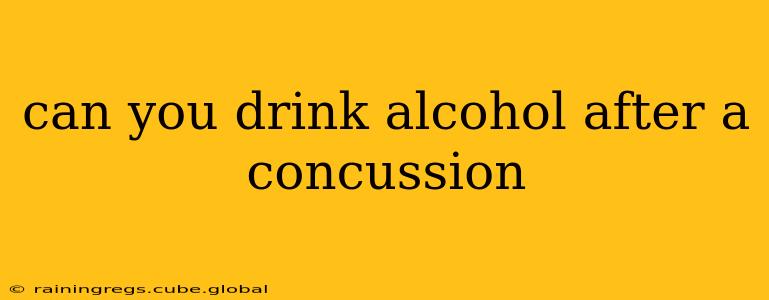Can You Drink Alcohol After a Concussion? A Definitive Guide
Experiencing a concussion can be jarring, leaving you feeling disoriented and vulnerable. One of the many questions that often arises during recovery is about alcohol consumption. The short answer is: no, you should not drink alcohol after a concussion. This is crucial for your brain's healing process and overall recovery. Let's delve deeper into why.
Why Should I Avoid Alcohol After a Concussion?
Alcohol is a central nervous system depressant. This means it slows down brain activity. After a concussion, your brain is already compromised and trying to repair itself. Introducing alcohol further slows down this delicate process, potentially hindering recovery and even leading to complications.
The effects of alcohol can exacerbate the symptoms of a concussion, including:
- Increased headaches and dizziness: Alcohol can intensify headaches, a common symptom after a concussion, making them more severe and persistent. Dizziness can also worsen, impacting balance and coordination.
- Cognitive impairment: Alcohol impairs cognitive functions like memory, concentration, and judgment – functions already affected by a concussion. This can prolong recovery time and make daily tasks challenging.
- Sleep disturbances: While alcohol might initially induce sleep, it disrupts the quality of sleep, which is crucial for brain repair. Poor sleep further hinders recovery and can worsen concussion symptoms.
- Increased risk of complications: In severe cases, alcohol can increase the risk of delayed recovery, prolonged symptoms (post-concussion syndrome), and even more serious complications.
How Long Should I Avoid Alcohol After a Concussion?
There's no magic number of days or weeks. The recovery period varies depending on the severity of the concussion and individual factors. It's best to abstain from alcohol until you're completely symptom-free and have received clearance from your doctor. This could range from several weeks to several months. Your doctor can assess your progress and advise you on when it's safe to resume alcohol consumption.
What are the Symptoms of a Concussion?
Recognizing concussion symptoms is vital for prompt treatment and recovery. These can vary in severity and may include:
- Headache: A persistent and often throbbing headache is a common symptom.
- Dizziness: Feeling lightheaded or unsteady.
- Nausea and vomiting: Feeling sick to your stomach.
- Blurred vision: Difficulty focusing or seeing clearly.
- Sensitivity to light and sound: Experiencing discomfort from bright lights or loud noises.
- Cognitive difficulties: Problems with memory, concentration, and decision-making.
- Fatigue: Feeling unusually tired and exhausted.
- Sleep disturbances: Difficulty falling asleep or staying asleep.
- Emotional changes: Irritability, anxiety, or depression.
If you experience any of these symptoms after a head injury, seek immediate medical attention.
Does Alcohol Affect Concussion Recovery Time?
Yes, alcohol significantly impacts concussion recovery time. By slowing down brain function and exacerbating symptoms, alcohol prolongs the healing process and increases the likelihood of experiencing post-concussion syndrome, a condition characterized by persistent symptoms for weeks, months, or even longer.
Can I Drink Alcohol if My Concussion Symptoms Are Mild?
Even with mild concussion symptoms, it's crucial to avoid alcohol. While the symptoms may seem minor, the brain is still recovering, and alcohol can interfere with this process. It's always best to err on the side of caution and prioritize your brain's health.
In conclusion, avoiding alcohol after a concussion is not merely a recommendation; it's a crucial step towards a safe and speedy recovery. Prioritize your health and consult your doctor for personalized guidance regarding your recovery and when it is safe to resume alcohol consumption. Remember, patience and prioritizing your brain's healing are paramount.
